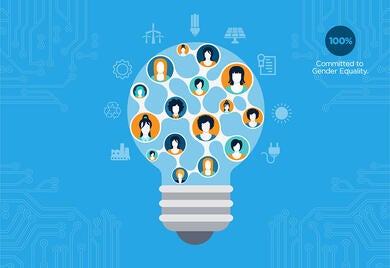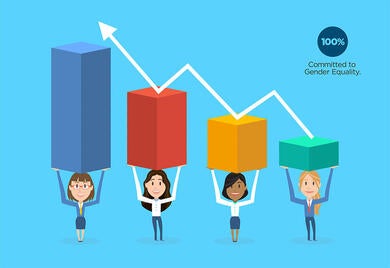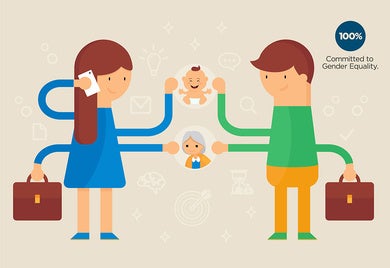
Three best practices for energy companies investing in women
Three years ago, Marie-José Nadeau took the helm as the first woman to chair the World Energy Congress in its 90-year-history. She cautioned that the energy business was at a critical stage, suffering from underperformance and facing disruptive change. In her view, the industry would not have the ability to innovate and tackle these challenges without gender diversity. At the time, only 4% of executive board members at the top 100 utilities companies were women. Today, this number has inched up by only 1%, according to EY’s 2016 Women in Power and Utilities Index. At this rate, it would take the power industry four decades to reach 30% of women participation in boards. [clickToTweet tweet="At this rate, it would take the power industry 4 decades to reach 30% of women participation in boards" quote="At this rate, it would take the power industry four decades to reach 30% of women participation in boards" theme="style1"] At the employee level, a handful of energy companies in Latin America and the Caribbean are starting to invest in recruiting and training female personnel in non-traditional roles, for example, installing solar panels in remote areas and changing LED public lighting in cities. As renewable energy scales up across the region, technical jobs in solar and wind will be in high demand. Energy companies will have to widen their talent pool to meet this need. Here are three ways energy companies are already investing in opportunities that benefit men and women: 1. Investing in gender certifications Gender certifications today are what LEED certifications were a decade ago —a third-party seal of approval for sustainability— and some companies in Latin America are already investing in them. Based in Switzerland, global certifier EDGE (Economic Dividends for Gender Equality) is increasing its presence in Latin America and the Caribbean. Another option is seeking certification at the country level. These type of gender certifications allows companies to map and benchmark their efforts to create, support and advance gender equality throughout the workplace. In Mexico, this was the route that an energy service company took to start transforming its corporate culture. Based in Monterrey, Óptima Energía works with cities to replace incandescent street lights with energy-efficient LED street lamps. Two years ago, Óptima Energía embarked on a gender certification program through the Mexican Standards for Labor Equality and Non-Discrimination. Investing in a gender certification is just one of many steps this company is taking to ensure an equitable and inclusive workplace that attracts the best employees. 2. Partnering with technical universities to train new talent The solar industry is growing exponentially in Latin America and the Caribbean, and demand for experienced solar technicians is outstripping supply of qualified people. The same is true for the wind sector. With nearly two million people employed in renewable energy jobs, the need for a steady pipeline of qualified talent is opening doors for women. In the last five years, Uruguay has become a powerhouse wind producer, steadily moving away from relying on fossil fuels and hydropower. Solar is now ramping up. In 2015, the energy companies Technova and Sky Solar started installing solar panels in Paysandú, a small city in Western Uruguay on the Argentinian border. The companies wanted to hire locally, and partnered with Universidad del Trabajo (UTU) and Instituto Nacional de Empleos y Formación Profesional (INEFOP) to train local personnel in the assembly of solar photovoltaic projects. They set a target of 40% female participation in their programs and met their goal. 3. Recruiting women in STEM fields In Latin America, 45% of scientific researchers are women, surpassing even the global average; yet, women are vastly under-represented in science, technology, engineering and mathematics (STEM) fields. Cultural and socioeconomic barriers often lead young women to drop out of school to meet traditional obligations like care giving. In Panama, Grupo Ecos invested in an internship program targeting female students on STEM and finance tracks for the Divisa Solar project, the first utility-scale solar park in the country. Financed by IDB Invest (formerly known as Inter-American Investment Corporation) and the Canadian Climate Fund for the Private Sector in the Americas (C2F), Divisa Solar is changing the conversation around traditional gender roles while benefitting local women professionals. Empowering women makes business sense The evidence is clear —greater gender diversity drives business success. As the renewable energy boom in Latin America leaps ahead, investing in opportunities for women professionals will be critical for energy companies to stay ahead of the curve. Alison Kay, EY global vice-chair of industry, put it in these terms: “In these times of disruptive change, as the sector undergoes fundamental transformation, diverse leadership teams make good business sense.” Subscribe to receive more content like this! [mc4wp_form]

The gender equality imperative in the workplace
Gender equality is paramount for increased inclusion as well as business profitability arising from their increased labor force participation.

How men and women sharing the workload can promote regional growth
Women do more unpaid work than men, with significant consequences for the economy. From India to Denmark, the pattern is the same. While women invest an average of 4.5 hours per day in unpaid work, men invest barely 1.5 hours. It is estimated that the unpaid work that women do worldwide is equal to $12 trillion a year, or 11% of global GDP for the year 2025. In the case of small businesses in Ecuador, which we analyzed in a study I published recently, we found that the most important factor explaining the differences between the profitability of companies managed by men and women is precisely the time dedicated to unpaid work: household tasks and caring for children and the elderly. This does not mean that women work less in their professions than men. In the sample I studied, men and women invest the same number of hours per day and the same number of days per week in their businesses. But women dedicate a larger number of hours to unpaid work in the home and, to a greater extent than men, also tend to perform many tasks at the same time ― multitasking―combining business activities with household work. There is extensive literature in psychology showing the negative effects of multitasking on performance. The greater the cognitive demand and the effort required to perform a task, the greater these effects. For this reason, we automatically stop talking to our passenger (task 1) when trying to pass a truck on a narrow road or merge onto a highway (task 2). However, when in the study we compare companies with the same characteristics (age of the business, capital, number of employees, sector of economic activity, age and years of education of the manager, etc.), including the time managers devote to the business and to unpaid work, we see that companies managed by men and women are equally profitable. This means that there is enormous economic growth potential if we resolve these disparities. Companies led by women in Latin America and the Caribbean could be an engine of growth for the region if men and women shared household tasks in a more balanced way, but it is difficult to imagine this change happening from one day to the next. On International Women’s Day we want to emphasize the importance of gender equality in the productivity of the region’s companies. Each of us has the task of contributing to this change. At IDB Invest, along with the Inter-American Development Bank, we have been working for more than a year on our campaign 100% Committed to Gender Equality, in which we have explored how public and private sector projects become more productive when they invest in equality. Similarly, at IDB Invest, we have created instruments, like the Women’s Empowerment Principles Gender Gap Analysis Tool (WEPs business gender tool); knowledge products, like our study “The Power of Gender Equality in the Workplace;” and we provide advisory services to help companies improve their gender equality standards. The time for sharing the burden is now and it is key to the growth of our region. Subscribe to receive more content like this! [mc4wp_form]